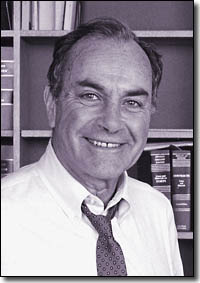Abram Chayes, International Law Specialist, Dies at 77

Felix Frankfurter Professor of Law, Emeritus Abram Chayes, 77, who served as the Kennedy Administrations chief international lawyer at the height of the Cold War and who taught at Harvard Law School (HLS) for more than four decades, died on Sunday, April 16, at Brigham and Womens Hospital in Boston, of complications from pancreatic cancer. He was a resident of Cambridge, Mass.
“Abram Chayes was one of the dominant figures in international law teaching and scholarship over the last third of a century,” said HLS Dean Robert C. Clark. “Boundless energy, intellectual brilliance, and commitment to students characterized his career as a teacher.”
“[He] devoted his career to building and sustaining an effective international legal order from arms control to conflict prevention,” said J. Sinclair Armstrong Professor of International Foreign and Comparative Law Anne-Marie Slaughter.
Said James Barr Ames Professor of Law Philip Heymann: “For Abe, problems were there to give joy to the people who tackled them. Over the years, teams of wonderful people would work under his tutelage.”
Chayes was born on July 18, 1922, in Chicago. He received his A.B. magna cum laude from Harvard in 1943. From 1943 to 1946 he served with the field artillery in France, Holland, Germany, and Japan. He was discharged with the rank of captain and returned to Harvard. He received his LL.B. magna cum laude from Harvard Law School in 1949. He served as note editor and then president of the Harvard Law Review.
After law school, Chayes served as legal advisor to Gov. Chester Bowles of Connecticut from 1949 to 1951. He then went to Washington, D.C., serving as associate general counsel of the Presidents Materials Policy Commission in 1951, as a clerk for Justice Felix Frankfurter of the U.S. Supreme Court from 1951 to 1952, and as an associate with Covington & Burling in Washington, D.C., from 1952 to 1955.
Chayes returned to Cambridge in 1955 to join the Law School faculty as an assistant professor, becoming a professor of law in 1958. Chayes was one of the initial group of Harvard faculty members who worked in the late l950s on President Kennedys campaign. He was the head staff person and lead draftsman of the l960 Democratic Convention platform, and during the fall of 1960 was one of the principal issues advisers to the Kennedy campaign.
In 1961, Chayes played a major role in the development of the United States position in the Berlin Crisis of 1961, the Cuban Missile Crisis of 1962, the Limited Test Ban Treaty of l963 (which banned atmospheric nuclear tests), and the establishment of Comsat (the Communications Satellite system).
Chayes came back to the Law School in 1965. In 1976, he became the Felix Frankfurter Professor of Law, and in 1993, he became the Felix Frankfurter Professor of Law, Emeritus.
After Chayes returned to Harvard Law School, he continued his work in international affairs. In l972 Chayes was one of the principal foreign policy advisers to the presidential campaign of Sen. George McGovern, and in l976 he was a foreign policy adviser to the presidential campaign of Gov. Jimmy Carter.
In the l980s, Chayes continued to spend considerable time on international law issues, ranging from Cold War questions to environmental and communications matters.
His publications include The International Legal Process (Little, Brown, 1968, 1969) and The New Sovereignty: Compliance with International Regulatory Agreements (Harvard University Press, 1996, 1998) with Antonia Handler Chayes.
He taught, among other courses, International Law, Civil Procedure, International Environmental Law and Institutions, International Peacekeeping, and Introduction to American Law.
In 1999 he received the Harvard Law School Association Award (HLSA). The HLSA Award, the highest honor given by the Association, recognizes sustained or extraordinary service to the legal profession and Harvard Law School as well as contributions to the public welfare that exemplify the values of Harvard Law School. The Law School celebrated his career with two days of panels and events concerning issues in international law on April 23 and 24, 1999.
He received the LL.D. in 1987 from Syracuse University College of Law. In 1996 he received the Peace Advocacy Award, with his wife, Antonia Handler Chayes, from the Massachusetts chapter of the Lawyers Alliance for World Security.
He leaves his wife, Antonia Handler Chayes; and five children: Eve Chayes Lyman of Los Angeles; Gail Chayes Lyman of Los Angeles, Kansas, and Roxbury, Mass.; Sarah Chayes of Paris, France; Lincoln Chayes of Los Angeles; and Angelica Chayes Swenson of Canaan, N.Y. He also leaves a sister, Judith Nieman of Baltimore and eight grandchildren.
Burial will be private. A memorial service will be held at Harvard University at a later date.




